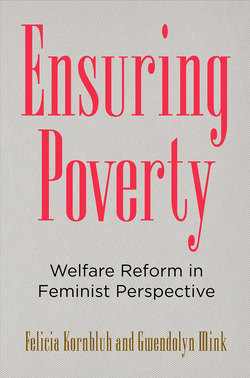Ensuring Poverty

Реклама. ООО «ЛитРес», ИНН: 7719571260.
Оглавление
Felicia Kornbluh. Ensuring Poverty
Отрывок из книги
Ensuring Poverty
Welfare Reform in Feminist Perspective
.....
Title I of the welfare reform law allowed the prerogatives of individual states to billow. To be sure, TANF legislation charged states with new duties, in cluding enforcement of new program rules. Further, TANF provisions required states to meet certain program participation goals in exchange for federal funds. Also, the new funding formula, block grants to states, capped federal funding to each state and required states to maintain a financial contribution to overall welfare spending under a “maintenance of effort” provision. Still, within the punitive paradigm, states were given wide disciplinary discretion over how to spend those funds—discretion wider than they had had at any time since the implementation of federal public assistance in the 1930s and 1940s.41
Under the 1996 law, individual state governments can turn away applicants for aid even if they meet every criterion of eligibility. If, for example, certain people have the misfortune to apply after state funds and the federal block grant have been exhausted, officials can legitimately turn them away. States also can discourage TANF enrollment even if funds are available, as many have done through “diversion” programs that direct applicants to exhaust all possible private aid before turning to public welfare. Indeed, caseload reduction incentives in the TANF law, combined with sanctions provisions and capped funding, have pushed states to constrict TANF participation even as the need for aid has failed to abate.
.....